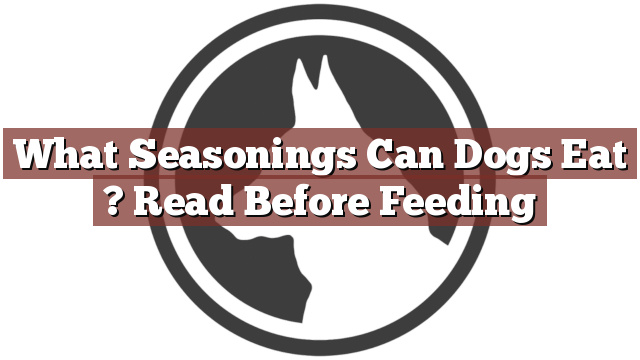Understanding Your Dog’s Dietary Needs
As responsible dog owners, it is crucial to understand our furry friends’ dietary needs and provide them with a balanced and nutritious diet. While dogs primarily thrive on a diet of high-quality dog food, it is natural for pet owners to wonder about incorporating certain seasonings into their meals. However, it is essential to remember that not all seasonings are safe for dogs, and some can even be harmful to their health.
What Seasonings Can Dogs Eat? Read Before Feeding
So, can dogs eat seasonings? The answer is not as straightforward as a simple yes or no. While there are some seasonings that dogs can safely consume in moderation, there are others that should be strictly avoided. It is important to remember that dogs have different digestive systems and metabolic rates than humans, and what may be harmless to us could be toxic to them.
Some of the safe seasonings that you can add to your dog’s diet in small quantities include:
- Turmeric: This spice has anti-inflammatory properties and can be beneficial for dogs with arthritis or other inflammatory conditions.
- Parsley: It can freshen your dog’s breath and also offers a small dose of vitamins A and C.
- Cinnamon: In small amounts, cinnamon can help regulate blood sugar levels in dogs.
- Ginger: It can aid in digestion and provide relief from nausea or an upset stomach.
- Basil: This herb contains antioxidants and can add some flavor to your dog’s food.
However, it is important to avoid feeding your dog certain seasonings that can be harmful to their health. These include:
- Onion and Garlic: These can damage a dog’s red blood cells and lead to anemia, especially when ingested in large quantities.
- Salt: Excessive amounts of salt can cause sodium ion poisoning in dogs, leading to symptoms like vomiting, diarrhea, and even seizures.
- Nutmeg: In large doses, nutmeg can be toxic to dogs and cause hallucinations, high blood pressure, and even seizures.
- Xylitol: While not a seasoning, xylitol is a common sweetener found in various products. It is highly toxic to dogs and can cause a sudden drop in blood sugar levels, leading to weakness, seizures, and liver failure.
Pros and Cons of Feeding Seasonings to Dogs
Feeding seasonings to dogs can have its pros and cons. On one hand, certain seasonings like turmeric and ginger can provide health benefits and aid in digestion. They can also make your dog’s meals more enticing, especially for picky eaters. On the other hand, it is crucial to remember that moderation is key. Too much of a particular seasoning can cause adverse effects on your dog’s health, even if it is generally safe in smaller quantities. Moreover, some seasonings like onion and garlic should be avoided altogether due to their potential toxicity.
Conclusion: Make Informed Choices for Your Dog’s Health
In conclusion, while some seasonings can be safely incorporated into your dog’s diet, it is important to do thorough research and consult with your veterinarian before introducing any new seasonings. Remember to always start with small quantities and monitor your dog’s reaction closely. Additionally, it is crucial to avoid feeding your dog any seasonings that are known to be toxic or harmful to their health. By making informed choices and prioritizing your dog’s well-being, you can ensure that they enjoy a healthy and balanced diet.
Thank you for taking the time to read through our exploration of [page_title]. As every dog lover knows, our furry friends have unique dietary needs and responses, often varying from one canine to another. This is why it's paramount to approach any changes in their diet with caution and knowledge.
Before introducing any new treats or making alterations to your dog's diet based on our insights, it's crucial to consult with a veterinarian about [page_title]. Their expertise ensures that the choices you make are well-suited to your particular pet's health and well-being.
Even seemingly harmless foods can sometimes lead to allergic reactions or digestive issues, which is why monitoring your dog after introducing any new food item is essential.
The content provided here on [page_title] is crafted with care, thorough research, and a genuine love for dogs. Nevertheless, it serves as a general guideline and should not be considered a substitute for professional veterinary advice.
Always prioritize the expert insights of your veterinarian, and remember that the health and happiness of your furry companion come first.
May your journey with your pet continue to be filled with joy, love, and safe culinary adventures. Happy reading, and even happier snacking for your canine friend!

